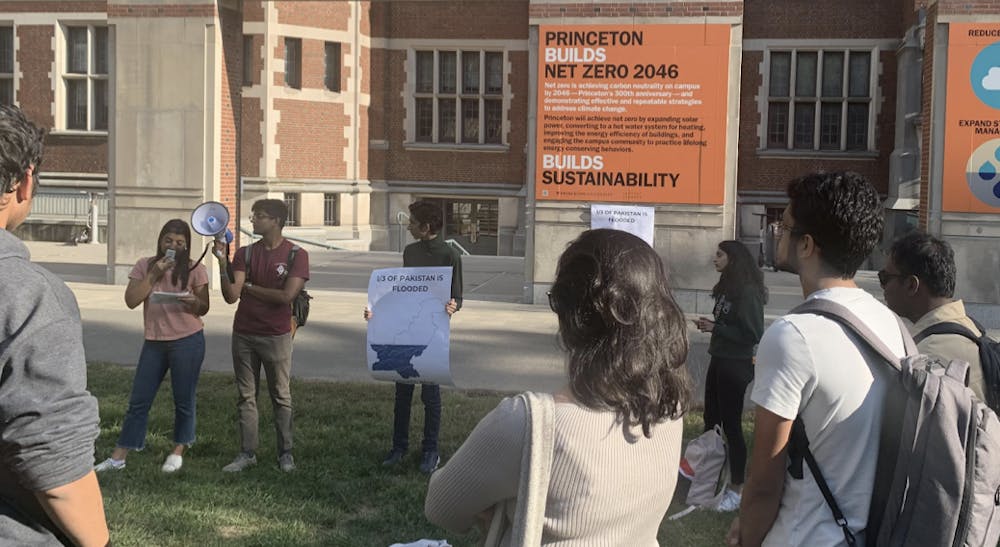The South Asian Progressive Alliance (SAPA) held a teach-in event on Monday, Sept. 26, and organized speeches in front of Frist Campus Center to promote their goal of raising $5,000 this week for Pakistan flood relief efforts. The speakers discussed the devastating impact of the floods, the implications of climate change, and the University’s responsibility to create change.
Since mid-June, heavy monsoon rains in Pakistan have led to catastrophic floods and landslides that destroyed homes, crops, and critical infrastructure.
Speaking to students gathered on Frist’s North Lawn, graduate student Meher Ali recounted the devastating effects of the floods.
“This is the worst flooding in Pakistan’s recorded history,” Ali said. “The rains are running at more than 780 percent above average levels of certain regions.”
Ali stood in front of a poster that showed one-third of Pakistan submerged in water. She explained that there has been “two million acres of crop trip and damage so far, one million livestock animals dead, [and] 250,000 homes destroyed.” More than 33 million people have been affected by the floods.
Aleha Amjad ’25, an international student from Lahore, Pakistan, equated the damage in Pakistan to “the entire state of New York being underwater and destroyed.”
Other speakers recounted their personal connections to Pakistan and urged the Princeton community to help in any way possible.
Aly Rashid ’26, an international student from Pakistan, described messaging his friends back home and realizing how bad the conditions had become.

“The most important text [my friend] sent me was ‘don’t just go by the numbers’ because the numbers on Al Jazeera, the numbers on CNN, [and] even the numbers that the Pakistani government is sending out aren’t painting the complete picture,” Rashid said.
Rashid is a Contributing Features Writer for The Daily Princetonian.
“[These sources] might tell you that these many schools have been destroyed,” he added. “They’re not telling you that those children are probably never getting education again. They might tell you that these many people are displaced, but they’re not telling you the amount of waterborne diseases that are spreading.”
Ali added that scientific evidence showed the floods are “not a one-off event.” These extreme weather conditions are expected to repeat in the future.

“Alongside the environmental causes, it's important to understand the legacies of both colonial and post-colonial regimes of development,” Ali said. She encouraged students to “support Pakistan’s case for loss and damage” and to “actively encourage conversations around, not just charity, but things like debt cancellation, which for Pakistan would be game changing.”
Ali explained that wealthy nations broke the promise to “channel a hundred billion dollars to less developed nations to fight climate change.”
“Pakistan is one of the most climate vulnerable countries in the world, although it contributes less than one percent of global greenhouse gas emissions while the G20 countries produce 80 percent,” she said.
Several other speakers at the event echoed Ali’s sentiments, and reflected on Princeton’s role in the larger climate crisis. Nate Howard ’25 criticized Princeton’s connections to the fossil fuel industry.
“Our institutional wealth, the wealth that Princeton will use to keep itself safe during the climate crisis, is built upon the pollution of our environment,” said Howard, who is active with Divest Princeton, a group that advocates for full divestment of the University’s endowment from fossil fuels. “The destruction and death in Pakistan is the result of extracted economic practices and fossil fuels that we are benefiting from today.”
Howard is a contributing columnist at the ‘Prince.’
Rashid emphasized the importance for individuals to help those in need, and said that even the smallest step can go a long way. He called for the Princeton community to “start peeking out of the orange bubble.”
“Ten dollars can mean a lot to the families there. Just asking the three people sitting next to you [in the dining hall], ‘Do you know what's happening in Pakistan?’ can mean a lot to the Pakistanis there,” he said. “Let us try to actually prove that Princeton’s motto really is to be in the nation’s service and in the service of humanity, including humanity 7,000 miles away.”
Faraz Awan ’24 emphasized the importance of this issue to the University and its surrounding areas: “[T]his is something that really needs to be spoken about to the broader Princeton community,” Awan said. “We can really do a lot to help out.”
History professor Divya Cherian said she felt the meeting was important to both register solidarity with the people of Pakistan, and to recognize that eventually, the climate crisis will affect everyone.
“We are all in this boat,” Cherian said.
Michelle Miao is a news and newsletter contributor for the ‘Prince.’ She can be reached at mm3350@princeton.edu, @michxllem on Twitter, or @_michelleiao at Instagram.
Jackie Zhou is a news contributor for the 'Prince,' she can be reached at jacqueline.zhou@princeton.edu.








